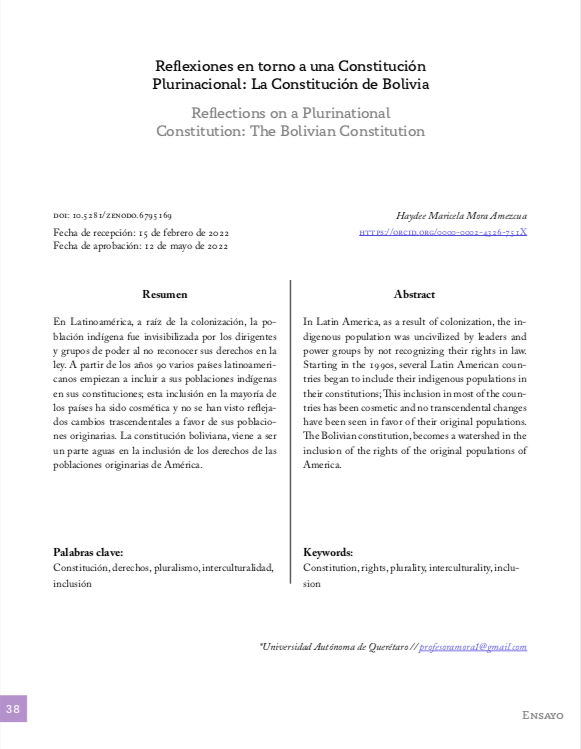
Keywords
rights
plurality
interculturality
inclusion
Abstract
In Latin America, as a result of colonization, the indigenous population was uncivilized by leaders and power groups by not recognizing their rights in law. Starting in the 1990s, several Latin American countries began to include their indigenous populations in their constitutions; This inclusion in most of the countries has been cosmetic and no transcendental changes have been seen in favor of their original populations. The Bolivian constitution, becomes a watershed in the inclusion of the rights of the original populations of America.

This work is licensed under a Creative Commons Attribution-NonCommercial-ShareAlike 4.0 International License.
Copyright (c) 2022 ALBORES
Similar Articles
- Mario Armando Vázquez Soriano, Editorial , Albores: Vol. 3 No. 5 (2024): Albores. Revista de Ciencias Políticas y Sociales
- Iván Patricio Ríos Sangucho, Discourses of inclusion, difference and normalization: The concept of inclusion in the construction of people with disabilities , Albores: Vol. 3 No. 5 (2024): Albores. Revista de Ciencias Políticas y Sociales
- Gerardo Cantú Sanders, Thinking of social rights as the center of human rights , Albores: Vol. 2 No. 3 (2023): Albores. Revista de Ciencias Políticas y Sociales
- María del Pilar Hernández Limonchi, Approach to indigenous youth problems in the Totonacapan of Puebla , Albores: Vol. 2 No. 2 (2023): Albores. Revista de Ciencias Políticas y Sociales
- José Antonio Carrera Barroso, Pedro Rafael Constantino Echeverría, Political transnationalism and the struggle for representation: #RedVotoChilango, a transnational network , Albores: Vol. 2 No. 2 (2023): Albores. Revista de Ciencias Políticas y Sociales
- Lourdes Leticia Machado Balbuena, Williams Chavero Jiménez, Juan Pedro Horta Sánchez, Mariana Itzel Nava Rodríguez, Impact of information and communication technology (ICT) on the child and adolescent population during the COVID-19 pandemic: Analysis from a bioethical perspective , Albores: Vol. 3 No. 4 (2024): Albores. Revista de Ciencias Políticas y Sociales
- Gabriel de Jesús Gorjón Gómez, Moisés David López Pérez, Telework and its possible regulation in Nicaragua's labor , Albores: Vol. 3 No. 5 (2024): Albores. Revista de Ciencias Políticas y Sociales
You may also start an advanced similarity search for this article.
Most read articles by the same author(s)
- Ruth Soto Balderas, The great work “Paseo 5 de Febrero” in Querétaro , Albores: Vol. 3 No. 4 (2024): Albores. Revista de Ciencias Políticas y Sociales
- Alberto Castro Valles, Maria Nieves González Valles, Karlotta Carrasco Castro, Perceptions of social rejection, emotional exhaustion, and substance consumption of sex workers in Ciudad Juarez , Albores: Vol. 3 No. 5 (2024): Albores. Revista de Ciencias Políticas y Sociales
- Edicson Andrés Oviedo Hernández, Balance of the operation of the United Nations Multi-Donor Fund in Colombia in the 2016-2022 period , Albores: Vol. 3 No. 5 (2024): Albores. Revista de Ciencias Políticas y Sociales
- Helena Marina Canudas Madrigal, Repertoires of Socio-State Interaction: A Qualitative Perspective of the Mayan Train in Yucatan and Tabasco , Albores: Vol. 3 No. 5 (2024): Albores. Revista de Ciencias Políticas y Sociales
- Aldana Victoria Epherra, Reflecting from Situated Perspectives. , Albores: Vol. 2 No. 2 (2023): Albores. Revista de Ciencias Políticas y Sociales
- Lorena Erika Osorio Franco, Editorial , Albores: Vol. 2 No. 3 (2023): Albores. Revista de Ciencias Políticas y Sociales
- Diana Guillén, Visual prints of a playful protest , Albores: Vol. 2 No. 2 (2023): Albores. Revista de Ciencias Políticas y Sociales
- Paulina Pereda, Vanesa del Carmen Muriel Amezcua, Carta Editorial , Albores: Vol. 1 No. 1 (2022): Albores. Revista de Ciencias Políticas y Sociales
- Luis Felipe Pérez Sánchez, The writer's archive as vindication: the intellectual Itinerary of Antonio Acevedo Escobedo (UNAM, 2020) by Dayna Díaz Uribe , Albores: Vol. 3 No. 4 (2024): Albores. Revista de Ciencias Políticas y Sociales
- Eduardo Solorio Santiago, Editorial , Albores: Vol. 3 No. 4 (2024): Albores. Revista de Ciencias Políticas y Sociales

